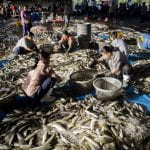
On Tuesday, February 23, our group spoke with Lauren Jackson who is the Research and Policy Officer at the Walkfree foundation. The Walkfree Foundation is based in Perth, Australia which made it very hard for us to interview them. Walkfree collects data and creates benchmarks in order to monitor companies and sometimes force them to do better. This benchmarking system is called the Global Slavery Index which is published every four years and is mainly directed for companies to monitor themselves instead of being targeted toward consumers.
The goal of the Index is to give companies a wake-up call when they are mistreating their workers. Walkfree visits these companies with their team and discusses solutions. Sometimes companies are very reluctant to speak with them which is a big struggle. This year they are re-evaluating companies and they expect that COVID-19 has made the forced labor issue even worse, which makes their benchmarks even more important. Lauren also talked about the migrant workers who were being left out of relief plans and made their lives even harder during COVID-19. This caused these workers to be even more desperate and forced people to make the tough decision to work in forced labor just to get the minuscule wages they earn there.
She also told us about the change that consumers need to make in order to pressure companies into treating their workers better. She recommends boycotting companies that use forced labor and talking to your representatives in order to change labor policies in your communities. This gave me more of an incentive to learn more about this topic so I can educate other people in the future. This interview inspired me to keep working and also educated me even more on the topic and the companies who abuse their workers.









